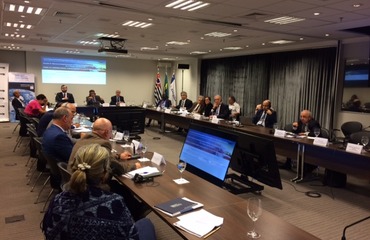São Paulo – The goal of the organizers of the seminar Assessing and Redefining Policies towards Africa in a New Global Scenario: Intersecting Perspectives between Brazil and Morocco this Monday (17) at the offices of Brazil’s National Federation of Industry (CNI), in São Paulo, was accomplished: to bring both sides together so they could get to know one another better.
According to Pedro da Motta Veiga, director of the Centre for Studies in Integration and Development (CINDES) – the Rio-based think tank which organized the seminar, alongside Morocco’s OCP Policy Center, the Brazilian Center for International Relations and CNI –, Brazil and Morocco are in the process of learning more about what each can offer the other.
“This is pretty much the only way to go about it: our countries did not sustain close ties in the past, we did not know one another. Now, we must find possibilities to cooperate, we must set priorities on both sides, and this is what we had here [at the event],” Veiga told ANBA. “I guess no one expected such practical results so fast. That is why the outcome has been positive.”
The director called attention to the featured speakers, who hailed from government, the private sector, and think tanks in both countries. “Getting these folks together to discuss something that’s not on the immediate agenda for Brazil is an achievement,” he explained.
Rubens Hannun, president of the Arab Brazilian Chamber of Commerce believes that the participation of important people from Morocco and Brazil shows the event’s relevance. To him, an important next step would be to hold a similar event in the African country.
Veiga, from CINDES, revealed that, at the end of October, Marrakesh will hold the Atlantic Dialogues, a yearly event organized by, among others, the OCP Policy Center. “Since the first edition they make a great effort to invite Brazilians. Certainly, this year there will be a Brazilian delegation attending,” he said.
Morocco’s ambassador in Brasília, Nabil Adghoghi, also highlighted the discussion regarding the African country being the gateway to the continent. According to him, the free trade agreements that Morocco holds with its neighbors and the policies regarding the private sector in the continent give this status to the country.
He also underscored the possibility of integration that arises: “Nowadays, we don’t think any more of what product to sell or buy. One country makes 10% of a product, the other one makes 30% and so on,” he explained, pointing out the improvements made by Brazil in the agribusiness, auto and renewable energy sectors. “Morocco has a growth potential regarding renewable energy,” said the ambassador.
In addition to its president, Hannun, who moderated a panel and took part in another, the Arab Chamber was represented in the event by its CEO, Michel Alaby, who gave a presentation on Brazil-Morocco economic ties.
*Translated by Gabriel Pomerancblum and Sérgio Kakitani




